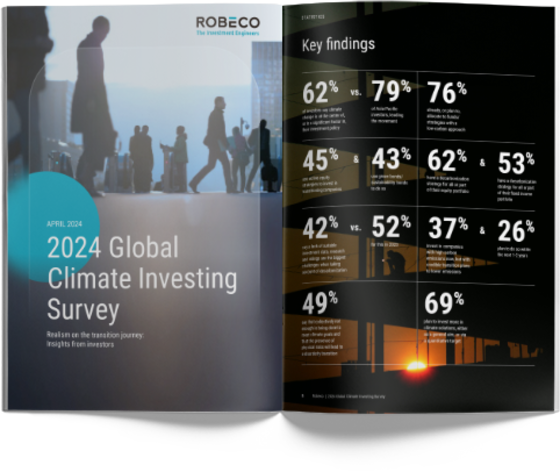

Asia makes huge strides in commitment to climate investing
Investors in the Asia-Pacific (APAC) region have moved ahead of Europeans in making tackling global warming a priority, the fourth Robeco Global Climate Investing Survey shows.
概要
- Commitments to climate investing and net zero rise significantly in Asia
- Regional differences also in motivations and perceived headwinds
- Much progress in accounting for emissions and use of engagement
The number of APAC investors for whom climate change is central to, or a significant part of, their investment policy was 79%, rising above Europe (76%) for the first time, and well above North America, where interest has fallen to a new low of 35%.
Even greater enthusiasm is shown in the longer-term aspirations of APAC investors, where 87% said climate investing would be a priority in two years’ time, this time slightly below the 89% of European investors committed to it, but still significantly above the 56% of North Americans for whom it will be significant.

Source (for all graphics): Robeco Global Climate Investing Survey, May 2024.
"One of the key themes this year is the strong progress by investors in the APAC region on climate investing," says Lucian Peppelenbos, Climate and Biodiversity specialist at Robeco. "Investors in this region are embracing investing in climate solutions and in the climate transition, two areas where we see great momentum in the market, in spite of the weakening climate action by political leaders.”
Wide regional differences
It was the first time in the four-year history of the survey of 300 international investors that such wide regional differences in attitudes have become apparent. It is partly thanks to the huge progress seen in Asia – the world’s highest-emitting region where some say the battle to tackle global warming will be won or lost.
It is also due, however, to a backlash against climate investing in North America over the perceived cost to returns of integrating environmental, social and governance (ESG) factors into investments. The slump in climate prioritization brought the global average of investors making climate a priority down from 71% to 62%, though the two-year projection showed an upswing to 77%.
Commitments to achieving net-zero emissions also rose in Asia, with 26% of investors now making a public commitment to decarbonize portfolios by the 2050 deadline, up from 20% in the previous survey. The net-zero commitment has remained stable in Europe at 37% but has fallen further in North America from 19% to 13%.
Greenwashing seen as biggest problem in Asia
There were also regional differences in what investors see as the main headwinds to implementing decarbonization strategies. Challenges around data, research, reporting standards and disclosure have diminished since 2023, along with challenges over accessing expertise and finding suitable products and strategies. But each region had a differing top concern.
In Asia, 40% of those surveyed cited the use of greenwashing to obscure the true impact of investment strategies as the main threat, along with a lack of suitable investment data, research and ratings (also 40%) and a lack of clear reporting standards and disclosures (39%). All were considered slightly less problematic compared with last year.
However, in North America, risk versus return considerations have increased as a challenge, in line with the growing ESG backlash, with 48% citing this as their top concern, up from 40% in 2023. In Europe, the biggest challenge was seen as the data issue – though this has dropped to 48% from 56% last year – while the perceived greenwashing threat also dropped, to 39% from 49%.

Half are now calculating emissions
More than half of investors in Asia-Pacific (52%) have now calculated the carbon footprint of their portfolios, using Scope 1 and Scope 2 emissions data, up from the 45% that had done so in 2023. Similar progress was seen in the number of investors taking steps to gain a forward-looking view on what pathway investee companies are on, and how that aligns with the Paris Agreement, with 45% of APAC investors now doing so compared with 35% in 2023.
And Asia now leads with the number of investors trying to measure Scope 3 emissions, which occur across the entire value chain and are far harder to calculate. Some 38% in APAC are using available data, modeling and best estimates to look at Scope 3, significantly up from 13% last year. This compares with 34% of European investors and just 13% in North America.

全球多元趨勢投資
荷寶精選趨勢投資策略的一站式平台
Developed markets are still preferred
However, while Asia has shown itself to be the new kid on the block when it comes to prioritizing climate investing, developed markets remain the preferred destination for investment funds, rather than the more nascent emerging markets. The survey showed that 60% of APAC investors have made direct investments via listed securities in commercially mature climate solutions in developed markets compared to 34% in emerging markets – almost identical to the situation in Europe.
The lack of more developed sustainable investing taxonomies in Asia also impacted the figures. Only 20% of APAC investors said they had adopted a sustainable taxonomy to identify and measure climate solutions compared to 44% in Europe, where the EU’s Sustainable Finance Disclosure Regulation (SFDR) and EU Taxonomy have helped to define standards.
Equities rule while green bonds rise
In terms of asset classes, investing in active equity strategies that specifically target allocations to transition-oriented companies remains the favored approach in both APAC and Europe, with 54% following this path. There was slightly more interest in investing in green bonds (52%) in Asia than in Europe (51%), and in transition-oriented fixed income strategies generally (39% vs. 37%).
Finally, the use of active ownership through engagement and stewardship was also more popular in Asia, where 38% said they encouraged external equity managers to adopt climate voting policies, compared to 29% in Europe. Some 38% in APAC said they had partnered with other asset owners to undertake collective engagement on climate issues against 30% in Europe, though in-house engagement capabilities have thus far been weaker in Asia.

下載刊物

More insights from the Global Climate Survey 2024
Important information
The contents of this document have not been reviewed by the Securities and Futures Commission ("SFC") in Hong Kong. If you are in any doubt about any of the contents of this document, you should obtain independent professional advice. This document has been distributed by Robeco Hong Kong Limited (‘Robeco’). Robeco is regulated by the SFC in Hong Kong. This document has been prepared on a confidential basis solely for the recipient and is for information purposes only. Any reproduction or distribution of this documentation, in whole or in part, or the disclosure of its contents, without the prior written consent of Robeco, is prohibited. By accepting this documentation, the recipient agrees to the foregoing This document is intended to provide the reader with information on Robeco’s specific capabilities, but does not constitute a recommendation to buy or sell certain securities or investment products. Investment decisions should only be based on the relevant prospectus and on thorough financial, fiscal and legal advice. Please refer to the relevant offering documents for details including the risk factors before making any investment decisions. The contents of this document are based upon sources of information believed to be reliable. This document is not intended for distribution to or use by any person or entity in any jurisdiction or country where such distribution or use would be contrary to local law or regulation. Investment Involves risks. Historical returns are provided for illustrative purposes only and do not necessarily reflect Robeco’s expectations for the future. The value of your investments may fluctuate. Past performance is no indication of current or future performance.























